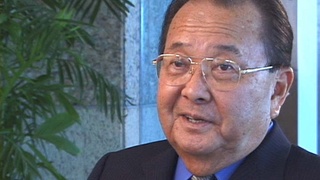Interviews
Angry about the mistranslations of his father’s testimonies
I wrote to Washington, D.C. on one hearing, I think it was Santa Fe, and the unfortunate part was there was a Korean – they didn’t have Niseis interpreting, they’re all in camp – so they had Koreans who speak a little Japanese I guess as the interpreter. And I know she meant well, cause she was struggling with English, you know, and probably struggling with Japanese too as my father was answering it. And I know it didn’t come out the way my father was saying it, I was starting to boil, so I wrote a letter to Washington, D.C. saying that this hearing…the record – I asked for a transcript but never got it – but I says it’s not right cause the translator, the interpreter, was completely off base.
And I wrote that letter to (Edward) Ennis, I think I wrote to Ennis, but I just got an acknowledgement, I received your letter, but nothing on that. So I can’t say anything, I’m listening to all that, and that’s the first time I’ve seen my father he was…first time I’ve seen him in tears, I just pictured him as a samurai all the time and he just looked haggard, you know. So that’s when I really start to get angry too, you know…
Date: March 25, 2005
Location: California, US
Interviewer: Sojin Kim
Contributed by: Watase Media Arts Center, Japanese American National Museum









